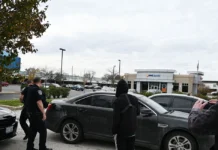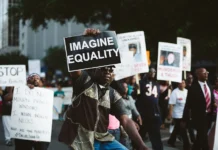In March 2017 at a retreat centre near Rye in Sussex, an invitation-only conference took place at which thirty six individuals were present. They were linked to one another through the fact all were men, all ordained and each had some connection with Jonathan Fletcher, the retired Vicar of Emmanuel Wimbledon. Invitations had been sent out in May 2016 for this gathering, and those invited appeared to be the personal selection of Fletcher. The conference had happened before but there are no details available of where it had been or who had attended. For this 2017 gathering, sixty were invited and of those, 60% accepted and were present at the Oast Houses Retreat Centre in March. From an examination of the first list of invitees, we discover that we have an almost complete Who’s Who of the REFORM/ReNew network in England. In short, there is, from looking at the thirty six names that did attend in March, a fair representation of the entire UK con-evo network. Jonathan Fletcher was clearly the one in charge of all the proceedings at the conference.
In writing this post, I would ask the reader to be aware of the significance of the date March 2017. Two things had happened earlier that year, both of which were to impact significantly on the con-evo world of REFORM/ReNew. At the beginning of 2017, the authorities of the Diocese of Southwark withdrew permission to officiate (PTO) from Jonathan Fletcher. He was at that point still a powerful figure right across the Anglican evangelical world. I can be excused in this post for not setting out again the reasons for this ban. They have already been shared in the public domain. But the fact of an inhibition on Fletcher’s ministry was important because of his powerful and influential hold over so many clergy and institutions at the time. He had for decades enjoyed real power. This he possessed through patronage, wealth, social charisma and a huge range of contacts. In particular, there was an entire generation of evangelical clergy, now in their 50s, who looked to him as their mentor. When the sudden fall came, it would have dismayed some of those close to him. But the effect on his ongoing ministry seems, in practice, to have been minimal. Many clergy and congregations seem not to have been told what had happened. If they did know, many simply ignored the fact that Fletcher was now non-grata with the wider church. Invitations continued to flow in and Fletcher, now officially retired, was able apparently to enjoy continuing to minister as he wished. He gave talks in 2017 at a Retreat run by St Andrews the Great Cambridge and a series of talks at St Michael Chester Sq. His public ministry was finally only brought to a halt when he was ‘outed’ by stories in the Daily Telegraph in June and December 2019.
The second important event of February 2017 was the Channel 4 programme about John Smyth. This event must have been a talking point among the attendees of the gathering as many present were the generation to have known him from attendance at the Iwerne camps as schoolboys or students. The impact of the exposure of Smyth was undoubtedly significant on the conference. Did those present argue for disclosure of what they knew or a cover-up? I think we can take a guess.
This conference held in March 2017 had no overriding theme. It was described as a meeting of ‘Jonathan Fletcher’s Group’. These were the individuals, in other words, who had chosen to be present in order to interact with Fletcher. With the help of Crockford online, which lists the training and careers of all the UK Anglican clergy, I was able to examine the profiles of all those present. This allowed me to work out how 36 careers had, at some point, interacted with the powerful figure of Fletcher. For over half the attendees, he was the one they looked up to at Iwerne camps; for others he was the one who had fostered a vocation into Christian ministry. Every one of them in some way had a significant attachment to Fletcher which made them keen to be at this conference. The age profile of those present was similar, and all had embarked on the path towards ordination at some point in the 70s and 80s. Each had attended one of the main residential evangelical theological colleges in England. Especially popular were Wycliffe Hall in Oxford and Ridley Hall in Cambridge. What I appeared to be witnessing in this conference was a gathering of some of those who had fallen under Fletcher’s spell. They were coming together to pay their homage to their mentor and patron. Their ministries were in part inspired by the influence of Fletcher’s personal charisma. There was, of course, a further loyalty, one to the theology, traditions and tribalism of the REFORM/Church Society networks. This they shared with their mentor.
Does the fact that there was this apparent private gathering of Anglican clergy to meet their highly respected, even if officially discredited, guru, really matter? After all, these clergy might claim that they did not know anything about the Southwark ban. That argument might work for many of those present, but for the fact that, in the room, there were three serving bishops. One was Julian Henderson, the Bishop of Blackburn (coincidentally nominated by Fletcher for membership of Nobody’s Friends in 2016). His recent comments on the CEEC video have been the cause of controversy. The others were the Bishop of Plymouth, Nick McKinnel and the flying Bishop of Maidstone, Rod Thomas. Another clergyman, Andy Lines, soon to be consecrated bishop by the American ACNA network, attended. Of the rest there were some well-known names from the evangelical world. The age-range of those attending was, as we have indicated, relatively narrow. We may suggest that the loyalties reflected in the group date from the time when Fletcher had his maximum influence in the Church -the mid-70s up to the end of the 80s. His hold over the evangelical world has still been strong since the 90s, but a new generation of leaders has begun to replace him.
A day visitor to the 2017 conference was the legendary Dick Lucas. He had presided as Vicar over St Helen’s Bishopsgate for a generation. Now in his 90s, Dick’s presence there helped, no doubt, to give the conference a sense of continuity with the past and possibly helping to bolster Fletcher’s own, now declining, influence in the REFORM world.
As I mentioned in the previous piece in connection with Bishop Rod, there was something jarring and probably highly irregular about the direct consultations between a serving Bishop and a discredited clergyman. Now that I discover that there was this further meeting attended by two other serving bishops, I am still more alarmed. What should happen when a PTO is withdrawn for safeguarding reasons? Although one would not expect a notice in the London Gazette to announce such a change of status, the whole point of taking away a PTO is to make the church safer. Are we to believe that bishops are ever kept in the dark over these matters? If none of them knew, then the safeguarding system is dysfunctional to the point of being useless. If they did know, that suggests a gung-ho attitude to safeguarding which makes each of the three a safeguarding risk. Clergy and bishops have been suspended from duty for such failures. Was their loyalty and desire to pay ‘homage’ to Fletcher greater than their desire to keep the church safe and protect the vulnerable? I am not going to describe the activities attributed to Fletcher, but, suffice to say, he was and is considered to be a serious safeguarding risk. We can allow, in the absence of other evidence, the ignorance of ordinary parish priests towards Fletcher’s behaviour. But something is going very wrong if serving bishops are kept out of the loop (or deliberately exclude themselves) in such a serious affair.
The very fact of a conference in 2017 presided over by Jonathan Fletcher in the presence of three serving C of E bishops makes a nonsense of the safeguarding protocols of the Church of England. Bishop Rod Thomas, who was officially overseeing Fletcher, seems to have had no authority in the situation. From what we can surmise he was behaving like a member of a Fletcher cult. I use that word carefully, but it is the only word that allows me to describe the way that Fletcher kept people like +Rod in thrall to him over several decades. From his days in Cambridge in the mid-70s to his thirty-year tenure at Emmanuel Wimbledon, Fletcher’s influence has been very strong in the Church. With the investigation to be published by thirtyone:eight next year, we hope to understand more of the healthiness or otherwise of that ministry. In the meantime, this blog will be questioning why the Church has seemed unable (unwilling?) to maintain any authority over a maverick and possibly dangerous ministry.



